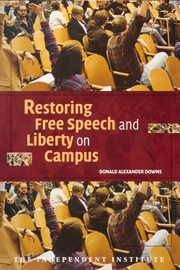Washington commissions typically elicit little more than a yawn. Their numerous unread reports gather dust on shelves all over the city, from Foggy Bottom to Capitol Hill. So why should we be concerned about legislation, approved by the U.S. House of Representatives in October and now pending in the Senate, to establish a bipartisan “National Commission on the Prevention of Violent Radicalization and Homegrown Terrorism”? Don’t we want to prevent these things?
Yes, we do. But we also want to prevent the government from engaging in ideological witch hunts or violating civil liberties, simply on the basis of what people believe.
Under the First Amendment, people enjoy the right to hold extreme beliefs so long as those beliefs are not used to incite unlawful action, or are not demonstrably connected to illegal or harmful action. Unfortunately, the language in the legislation establishing the new commission could jeopardize this right.
The bill defines “violent radicalization” as “the process of adopting or promoting an extremist belief system for the purpose of facilitating ideologically based violence to advance political, religious, or social change.” “Homegrown terrorism” is defined as “the use, planned use, or threatened use, of force or violence by a group” in the United States “to intimidate or coerce” the government or civilians to achieve the group’s objectives.
The commission would focus on research and data analysis and would have no explicit law enforcement or subpoena power. The commission’s tasks would include information gathering, coordinating and facilitating research, and analysis of data and information gathered by local, state, national and foreign governments, nongovernment organizations and academic sources. The bill also calls for establishing a university-based “Center of Excellence” for the study of such threats.
The jihadist terrorism we confront is indeed ideologically based, so better understanding the links between ideology and terrorist acts is a legitimate and important government activity. So why should we be concerned that the legislation threatens civil liberties?
First, because the commission’s mandate is not totally clear. While the pending Senate bill (S.1959) would seem to describe the commission’s mission with considerable care, it also seemingly gives the proposed commission a blank check to pursue “other purposes.” What other purposes? This is an invitation to mischief.
The legislation also provides that commission activities “should not violate the constitutional rights, civil rights, or civil liberties” of citizens and lawful permanent residents. This too should raise a cautionary flag: The bill says the commission “should not” violate civil liberties, rather than use a more definitive prohibition—such as “shall not.”
Besides, the bill leaves out important details about the commission and its duties. How will the commission’s findings be used? Will groups that hold extremist beliefs and use scary rhetoric find themselves subject to undue scrutiny and pressure, even if they pose no meaningful threat? Will the commission find itself in the business of “naming names” without proper provisions for due process and basic fairness? S.1959 and its House companion are silent about such matters.
In addition, the bill’s definitions of terrorism and radical violence—like similar definitions in the U.S.A. PATRIOT Act—are broad. They are not limited to al Qaeda-like violence that poses an existential danger to the United States. As presently defined, the commission’s mandate also could include such groups as People for the Ethical Treatment of Animals (PETA), violent anti-abortion coalitions and similar groups. Though such groups pose legitimate law enforcement concerns, they do not constitute a national security threat that justifies extraordinary measures.
Is such a commission even necessary?
The U.S.A. PATRIOT Act already facilitates information sharing between government agencies, and the Constitution permits governmental monitoring of extremist groups, so long as such monitoring does not transgress the First and Fourth Amendments. Courts have made the Fourth Amendment flexible in this area; and though First Amendment standards are strong, courts generally do not consider extensive monitoring a violation of its protections. Meanwhile, academic and government research on terrorism already have mushroomed.
Before the Senate takes up this legislation, the public needs more evidence such a commission is needed, its mission will be limited to meaningful national security threats, and safeguards will be put in place to protect free thought and civil liberties.








